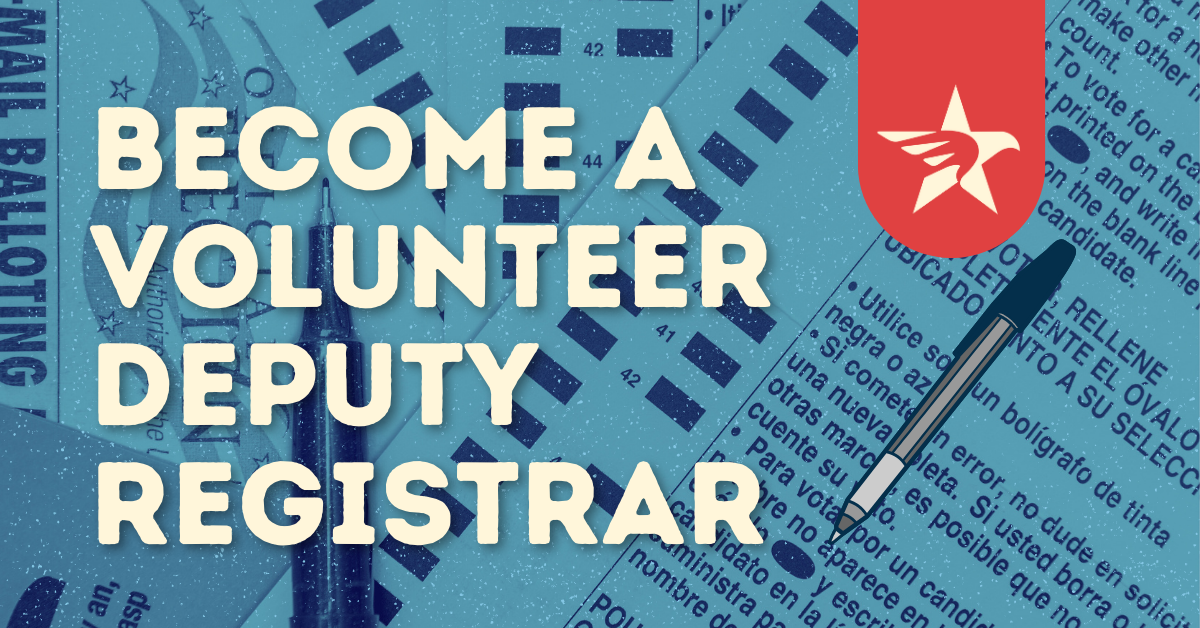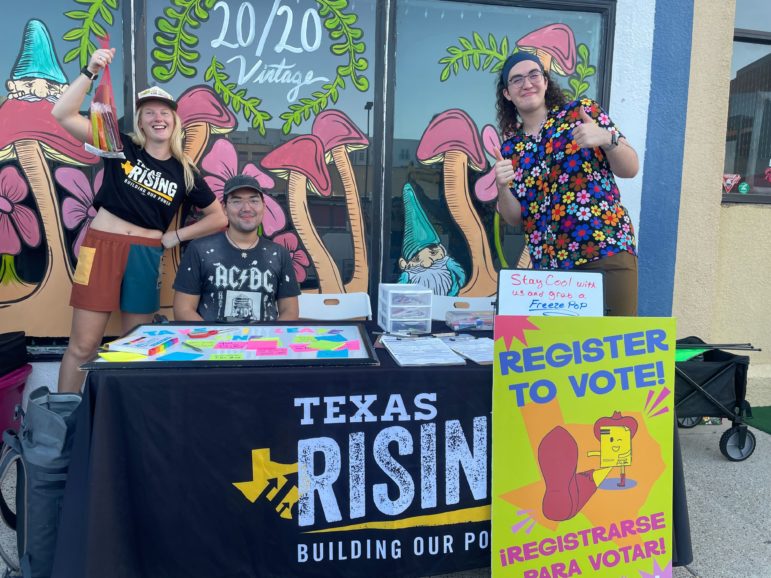
A Volunteer Deputy Registrar (VDR), or a Volunteer Deputy Voter Registrar (VDVR), is a community volunteer entrusted with the responsibility of officially registering voters in the State of Texas.
Right now, we know there are thousands of Texans who qualify to vote — they just need the support to register. If we can get more voters registered and turning out at the ballot box, we can elect candidates that are truly representative of our progressive values. Looking for an actionable way to support our democracy? Become a VDR and register people to vote!
Qualifications to Become a Volunteer Deputy Registrar (VDR)
According to the Secretary of State, to be appointed a volunteer deputy registrar, you must:
- Be at least 18 years of age
- Be a U.S. citizen
- Be a Texas resident
- Not have been declared by a probate court to be “totally mentally incapacitated or partially mentally incapacitated without the right to vote”
- Not have been convicted of the following:
- Failing to deliver a voter registration application to a voter registrar
- A felony (unless you’ve successfully completed your punishment or been pardoned)
- Identity theft
How to Become a Volunteer Deputy Registrar (VDR)
Before you even get started, make sure you’re registered to vote at your current address. You can use this handy voter registration check tool on our website. VDRs aren’t technically required to be registered voters, but for obvious reasons, they should be!
VDR training and appointments are handled within each Texas county, which means things might look different depending on where you are. But here are the basic steps:
Step 1: Contact the voter registrar in your county.
They’ll provide you with information about how training will be offered and completed.
- Googling “volunteer deputy registrar [county]” is probably the quickest way to find your county’s specific instructions and contact information.
Step 2: Complete the required training, whether virtual or in-person.
- Check with your county to see if they accept virtual training.
TIP
If you’re having difficulty finding a training that works with your schedule, inquire about your county’s reciprocity process. You may be able to use a virtual training happening in a different county. Some counties offer a quick and efficient reciprocity process — just ask!
Step 3: After your training and exam (if required), the voter registrar will appoint you as a VDR and advise you of any county-specific procedures.
They will issue you a certificate of appointment and give you a receipt book or voter registration applications with a tear-off receipt.
Important! You may not receive any voter registration applications until you have completed the required training.
On the Ground
This VDR guide from the Secretary of State goes into all aspects of the role, from distributing and accepting applications, to helping folks through their registration, to reviewing completed applications, to delivery.
TIP
There’s no way to become a statewide VDR, but you can get appointed as a VDR in multiple counties. Consider applying for reciprocity for other counties in your area. Sometimes, all you have to do is let them know you’re a VDR in another county and get them that info.
Tips from TFN Staff
Here are some tips from Texas Freedom Network staff members who serve as VDRs!
“Don’t let the process intimidate you! Going to the courthouse or county office can be scary. When I was a VDR, I would go with a buddy or a member of Texas Rising.”
– Sabrina Bustillos
“Always double-check the Voter Registration Application for full completion, make sure to ask them if the address they listed is a house or apartment so you can list their apartment number, and make sure they reside in the county you are VDR-certified for.”
– Jasmine Tellez
“Never assume. Ask everyone if they need to register to vote, and make sure folks are registered at their current address! Some folks have registered but have moved since then, and that can affect what city council or county commissioner race they can vote in. And be friendly to folks, especially those who are new to voting. You’re inviting them to join our democratic process, so it’s important to be open and patient with any questions. Don’t condescend!”
– Hannah Hughes
“Keep your training materials on hand for quick reference. Things can seem confusing or scary (it’s a big responsibility), but if you keep up to date with trainings and new laws you’ll be just fine, and you’re providing an invaluable service to your community!”
– Stephanie Dominguez
“Sometimes people just don’t want to talk, but you should always ask if they’d like to get registered to vote. You’re asking them an important thing. Don’t be embarrassed or discouraged if they say no!”
– Mel Leblanc
More Information
For more helpful information, including a Volunteer Deputy Registrar guide and FAQs, visit the Volunteer Deputy Registrar Page of the Secretary of State website.



